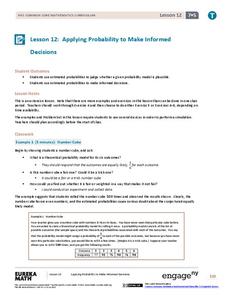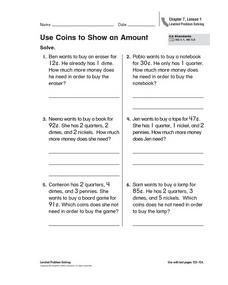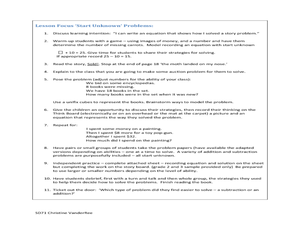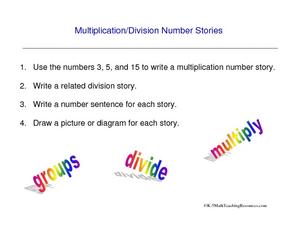EngageNY
Margin of Error When Estimating a Population Mean (part 1)
We know that sample data varies — it's time to quantify that variability! After calculating a sample mean, pupils calculate the margin of error. They repeat the process with a greater number of sample means and compare the results.
EduGAINs
Ratio and Proportion
Do these items have the same ratio? Through a learning contract, pupils master proportions by practicing proportions via word problems, graphs, and with manipulatives. An exit ticket checks for understanding at the end of the...
EngageNY
Conducting a Simulation to Estimate the Probability of an Event
How can you complete a simulation when it is not practical to determine the probability of an event? Class members learn that in some situations, it is not feasible to find the probability of an event, but they can estimate it by running...
EngageNY
Conducting a Simulation to Estimate the Probability of an Event II
Add some randomization into simulations. The 11th installment in a series of 25 presents two new methods to use in simulations--colored disks, and random numbers. Pupils use random numbers to run simulations where the probabilities make...
EngageNY
Applying Probability to Make Informed Decisions
Use simulations to determine the probabilities of events to make decisions. Class members are presented with several scenarios, some with known probabilities and others without. Groups run simulations to gather data that they then...
Curated OER
Exploring Geometry on the Sphere
In this geometry worksheet, students define important vocabulary dealing with circles. They measure cricles to the nearest degree. There are 11 word problems to be solved.
EduGAINs
Solving Linear Equations
To find x, you have to get it by itself, correct? Individuals solve a linear word problem and share their solutions with others that solved the problem in a similar fashion. They then complete a self-assessment on how they feel about...
EngageNY
Using Trigonometry to Find Side Lengths of an Acute Triangle
Not all triangles are right! Pupils learn to tackle non-right triangles using the Law of Sines and Law of Cosines. After using the two laws, they then apply them to word problems.
EngageNY
Events and Venn Diagrams
Time for statistics and learning to overlap! Learners examine Venn Diagrams as a means to organize data. They then use the diagrams to calculate simple and compound probabilities.
EngageNY
Using Sample Data to Estimate a Population Characteristic
How many of the pupils at your school think selling soda would be a good idea? Show learners how to develop a study to answer questions like these! The lesson explores the meaning of a population versus a sample and how to interpret the...
EngageNY
Sampling Variability in the Sample Proportion (part 1)
Increase your sample and increase your accuracy! Scholars complete an activity that compares sample size to variability in results. Learners realize that the greater the sample size, the smaller the range in the distribution of sample...
EngageNY
Systems of Equations Leading to Pythagorean Triples
Find Pythagorean Triples like the ancient Babylonians. The resource presents the concept of Pythagorean Triples. It provides the system of equations the Babylonians used to calculate Pythagorean Triples more than 4,000 years ago. Pupils...
EngageNY
Addition and Subtraction Formulas 2
Knowing the addition formulas allows for the calculations of double and half formulas. The fourth installment of 16 has the class use the addition formula to develop the double angle trigonometric formulas. Using the double formula,...
EngageNY
Estimating Probabilities by Collecting Data
Take a spin to determine experimental probability. Small groups spin a spinner and keep track of the sums of the spins and calculate the resulting probabilities. Pupils use simulated frequencies to practice finding other probabilities to...
Teach Engineering
All About Linear Programming
Class members connect engineering with an understanding of linear programming using a technical resource. Scholars learn about linear programming (linear optimization) and how it applies to engineering design in the first of two modules....
Curated OER
Multiplication & Division Word Problems, Bilingual (Middle, Mathematics)
Students use multiplication, division, addition, and subtraction to solve problems; Estudiantes utiliza la multiplicaci??n, la divisi??n, la suma, y la resta para hacer los siguientes
Curated OER
Use Coins to Show an Amount
For this counting coins worksheet, learners read the money amounts within the word problems and then determine which mathematical operation to use to solve the word problems and find the amounts.
Curated OER
Square Roots
Students differentiate between perfect roots and rational roots. For this algebra lesson, students perform operation using roots. They add, subtract, multiply and divide rational expressions.
Curated OER
The Phone Bill Problem
Students write an equation for a linear function. In this algebra lesson, students collect data, plot it and graph it. They identify the equation of the graphed data and define the slope and y-intercept of the graph.
Curated OER
Brain Booster: Doubles
In this problem solving learning exercise, students read, solve and illustrate the answers to 2 mathematical word problems involving numbers and doubles.
Curated OER
Using Basic Properties to Solve Problems in Math
Learners identify and define the rules of properties of real numbers. They rewrite each of the problems listed using the commutative or associative properties. Pupils apply problem solving strategies to clarify situations in a table...
Curated OER
Solve Story Problems: Sold! A Mathematics Adventure
Young mathematicians listen to the book Sold!: A Mathematics Adventure by Nathan Zimelman where they encounter ways to solve story problems. They then create and solve start unknown addition and subtraction equations. Resource builds in...
Curated OER
Multiplication/Division Number Series
Expand mathematical thinking with these prompts for scholars to use writing as they approach math. First, they use the numbers 3, 5, and 15 in an original multiplication number story, followed by a related division story. Encourage...
BW Walch
Linear & Exponential Functions
Positioned inside the framework of linear and exponential functions, this lesson is more of an investigation into the effects of changing variables and constants inside an expression. The author takes familiar formulas, those for...

























